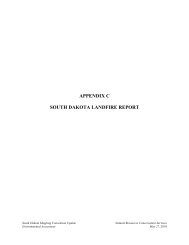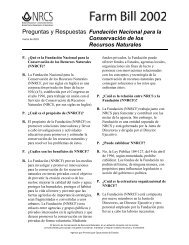The Ozette Prairies of Olympic National Park - Natural Resources ...
The Ozette Prairies of Olympic National Park - Natural Resources ...
The Ozette Prairies of Olympic National Park - Natural Resources ...
Create successful ePaper yourself
Turn your PDF publications into a flip-book with our unique Google optimized e-Paper software.
lands and to lack <strong>of</strong> a road from LaPush to Mora, few horses and only two teams are owned in the whole<br />
village. <strong>The</strong>ir best salalberry and crabapple grounds were situated about 6 miles east <strong>of</strong> LaPush… All<br />
burdens were carried in canoes or in baskets by means <strong>of</strong> tumplines (haq’waqstiL) <strong>of</strong> cedar or, now, rags,<br />
worn by the women on their foreheads. Young babies were carried by women in the folds <strong>of</strong> their blankets<br />
in front <strong>of</strong> them (Likwtipilil). <strong>The</strong>se blankets were tied around the waist <strong>of</strong> the woman by means <strong>of</strong><br />
a packstrap, and the two ends <strong>of</strong> the blanket were fastened together on the right shoulder by means <strong>of</strong> a<br />
pin made <strong>of</strong> bone. Older children were placed on the top <strong>of</strong> the baskets (t’axaq’wadasLil), carried by the<br />
women with tumplines. In case there were two children, the man usually carried the larger in the same<br />
way.<br />
[4:39] Arthur Howeattle and Tommy Payne – Social Organization<br />
<strong>The</strong> village community (wic’hiyolit) was divided into greater families (ho’oLwat), house groups<br />
(wiLqpat) and nuclear families (wiLwat). <strong>The</strong>re was no clan system. <strong>The</strong> whole tribe owned the tribal<br />
territory in common due to mythic common origin. Greater families and house groups had rights (usually<br />
accorded to the status person in the family or group) to economic resources, names, dances and songs.<br />
Individuals had guardian spirits (t’axilit) that were acquired originally by individuals and thereafter<br />
heritable to descendants. <strong>The</strong>se crests had nothing to do with the common origin <strong>of</strong> the family from one<br />
ancestor… Thus, Arthur’s great grandfather was a great t’axilit-man. His crest was the Thunderbird and<br />
Whale (a crest associated with the mythic history <strong>of</strong> the origin <strong>of</strong> the prairies). <strong>The</strong> Howeattle family<br />
obtained it from him.<br />
[4:57] Land was neither individual nor family property. It belonged to the whole tribe. A man or family,<br />
however, was looked upon as the proprietor <strong>of</strong> the place on which he built his permanent fishing, digging<br />
or hunting houses. <strong>The</strong>se houses could be inherited. A man wishing to settle on a place asked nobody’s<br />
permission provided it was not occupied by anybody else….Berrying and root digging grounds were also<br />
common property. <strong>The</strong>se common grounds were only accessible to the members <strong>of</strong> the tribe. Outsiders<br />
[non-Quiliutes] were excluded from them.<br />
[4:61] Festivals.<br />
In former years, up to about 70 years ago, the only presents given during a potlatch consisted <strong>of</strong> food<br />
such as dried salmon, camas, etc. [baskets <strong>of</strong> camas are always mentioned as preferred gifts at potlatches,<br />
e.g. 4:67; and were valued trade items, i.e. 3:142]<br />
[4:81] Arthur Howeattle - Birth, Childhood, etc. (incl. Taboos)<br />
A woman with child for the first time and any pregnant woman had a good many taboos (apolaks, “it<br />
is taboo for her to …”) imposed upon her. [<strong>The</strong>se affected a pregnant woman or new mother visiting or<br />
136
















